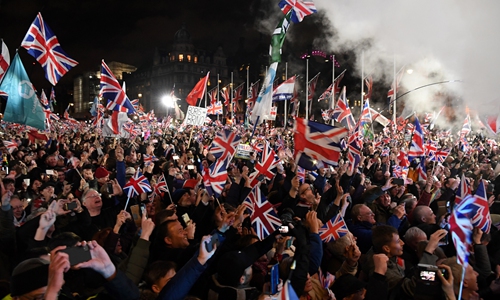HOME >> WORLD
Britain eyes early free trade deal with Australia
Source:Agencies Published: 2020/2/6 19:48:46
UK wants 'Canada-style' pact with EU

Brexit supporters wave Union flags as the time reaches 11 o'clock, in Parliament Square, venue for the Leave Means Leave Brexit Celebration in central London on Friday, the day the UK formally left the European Union. Photo: AFP
British Foreign Secretary Dominic Raab hopes a free trade deal with Australia will be one of the first such pacts to be secured, now that Britain has left the European Union, he said Thursday.
After formally leaving the EU on January 31, Britain entered a transition period that allows it to negotiate future ties with Brussels and begin talks with other major economies, such as the US and Japan.
"We have a trade relationship already worth 17 billion pounds, but we have the potential to do so much more," Raab told reporters in the Australian capital of Canberra. The figure is equivalent to $22 billion.
"Australia hopefully will be part of that first wave of high priority deals that we are pursuing," added Raab, speaking after he met Australian Foreign Minister Marise Payne.
Australia is in the midst of talks with the EU for a trade deal, but Payne said the talks with Brussels would not slow the progress of a British deal.
Although Australia has strong ties with Britain as a former colony, the trading relationship has waned significantly over the last 50 years. Britain now takes just 3 percent of Australia's exports, while China takes nearly 40 percent. Britain's entry into the Common Market in 1973 was widely considered a betrayal in Australia, upending decades of tradition and a host of tariff deals.
Supporters of Britain's exit have argued, however, that "family ties" with Commonwealth members, such as Australia, could compensate for the partial loss of Europe's 444 million customers.
Britain's Europe minister Christopher Pincher said in Warsaw on Wednesday that Britain wants a Canada-style agreement with the EU that includes goods and services.
"We want a Canada-style agreement that incorporates goods and services and cooperation in other areas. We accept that comes with consequences ... for both sides," Pincher said at an event in the Polish capital.
The Comprehensive Economic and Trade Agreement between the EU and Canada sets out the removal of tariffs on 99 percent of all types of goods, some over a period of up to seven years.
However, it limits volumes of some exports into the EU of pork, beef and frozen lobsters, reflecting Europe's traditionally protective stance to its farming sector, along with dog or cat food and track suits, ski suits and swimwear.
Canadian financial firms need licenses to operate in the bloc and must comply with EU regulations. Both sides must treat each other's sectors equally, but a "prudential carve-out" also allows for measures to limit access.
Posted in: EUROPE,WORLD FOCUS